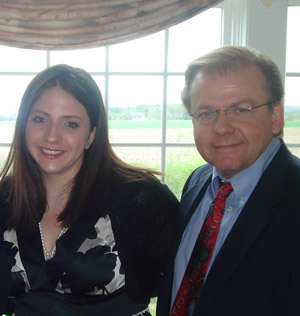May 24, 2011
Like father, like daughter: K-State alumna and her dad share research interests between K-State and Plum Island

Call it family destiny, but Jessica Rowland says following in the research steps of her father fulfills a dream.
Rowland, a 2006 Kansas State University graduate, is a microbiologist at Plum Island Animal Disease Center, an East Coast federal research and diagnostic facility that will relocate to Kansas. A strong -- and sometimes competitive -- relationship with her father, Raymond "Bob"Rowland, a virologist and K-State professor of diagnostic medicine and pathobiology, helped her get there.
"Working at Plum Island has always been a dream of mine," she said.
Although Rowland grew up around science, her father and mother, Francine Rowland, never intended their daughter to study the same field as her father. But as their daughter grew older, they saw how much she enjoyed science and how it came naturally to her. Now that father and daughter both research pig viruses at different laboratories, it can lead to some family-friendly competition.
"We work in the same area of research and diagnostics and use a lot of the same techniques, so we still compete," Bob Rowland said. "She'll call me and I'll think we're having a father-daughter conversation, but she's probing me for information. I end up setting down the phone and I thinking I've just been had."
Of course, the competition is all in good fun and has led to collaborative opportunities for both scientists. Most recently, father and daughter co-authored a chapter in the updated version of "The Diseases of Swine," due out later this year.
"To this day, my dad is still a really good mentor," Jessica Rowland said. "I like how he seems to focus a lot on the big picture of things and is good at putting things in perspective."
When Jessica Rowland was studying microbiology at K-State, she worked in several research laboratories -- including her father's porcine reproductive and respiratory syndrome lab -- giving Bob Rowland the challenge of balancing his roles as father and research leader.
"I could never get her to clean up her room as a dad," Bob Rowland said. "But when she was in the lab, we would have serious conversations and she would say, 'Dad, you're right,' which you never hear as a parent.
"It was fun to bond with my dad, but at the same time it was really challenging," Jessica Rowland said. "Some people may think because you worked with your dad, you got off easy or received special treatment. I would say it was actually the opposite, and he was probably harder on me than anyone else because I was his daughter."
She jokingly said her father always volunteered her for the tough jobs. For one project she had to sleep in a barn, waking every hour to keep an eye on suckling pigs. On another project she had to learn how to collect pig semen. But she said those difficult projects helped her land her current job.
"The best thing that prepared me for what I do now is the research," Jessica Rowland said. "Any undergraduate who is thinking about pursuing a career like this, the number one thing they can do is the research."
A month before graduation, Jessica Rowland landed a fellowship working with the Oak Ridge Institute of Science and Education on Plum Island, which eventually led to a full-time position working in the Foreign Animal Disease Diagnostic Laboratory. The National Bio and Agro-defense Facility, or NBAF, in Manhattan will replace Plum Island as a top federal laboratory for research and diagnostics to combat biological threats in animal and agricultural diseases.
"She is a good example of what K-State students are capable of," Bob Rowland said. "There is a tremendous wealth of opportunities for our undergraduates to have similar experiences."
At Plum Island, Jessica Rowland works in the proficiency and validation services section, which validates and develops new tests in addition to administering proficiency testing for the National Animal Health Laboratory Network, a network of labs across the United States.
She trains veterinarians and diagnosticians on molecular tests for the detection of classical swine fever and foot and mouth disease. She is also a member of the bioforensics staff, which provides forensic testing for foreign animal disease agents through collaboration with the FBI, U.S. Department of Homeland Security and National Bioforensic Analysis Countermeasures Center.
Most recently, she has helped in the development of two new tests: a pan-viral microarray that can detect thousands of viruses at once and a next-generation sequencing technique that allows scientists to characterize a virus that is identified by microarray.
"This kind of diagnostic development gives us the opportunity to rapidly characterize and detect something with one test, as opposed to doing a hundred different tests," she said. "Within a few days you will have tons of data characterizing whatever is in the sample."
Since her days at K-State, Jessica Rowland has continued her success as a researcher. In 2009 she was part of the Foreign Animal Disease Diagnostic Laboratory team to publish in the prestigious journal Science about their discovery of swine as a host for the Reston Ebolavirus, a discovery originating from a diagnostic case from the Philippines. A few years ago, she returned to K-State to instruct in a U.S. Department of Agriculture training session at the Biosecurity Research Institute.
And while Jessica Rowland enjoys working on the East Coast and taking a ferry every day to get to Plum Island, she still has a fondness for her alma mater.
"I did a lot of growing up in the time that I was at K-State," she said. "I found out who I was and what I wanted to do for the rest of my life."
